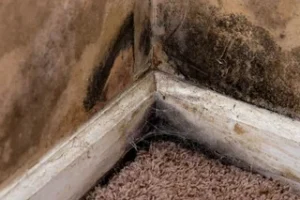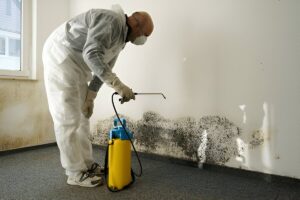Flooding can wreak havoc on homes, particularly in areas like Union, NJ, where heavy rains and storms can lead to significant Flood Damage in Union NJ. When floodwaters invade a property, they not only cause immediate destruction but also create an environment conducive to mold growth. Mold can pose serious health risks and lead to costly repairs if not addressed promptly. Understanding how flood damage can lead to mold issues and knowing the steps to prevent them is crucial for homeowners in Union, NJ.
Understanding Flood Damage
Flood damage refers to the destruction caused by water entering a home, often due to natural disasters like hurricanes, heavy rainfall, or even plumbing failures. The extent of damage can vary significantly based on several factors, including the volume of water, the duration of exposure, and the materials affected.
Types of Flood Damage
- Structural Damage: This includes damage to the foundation, walls, and roof of a home. Water can weaken structural components, leading to potential collapse if not addressed.
- Content Damage: Personal belongings, furniture, and appliances can be severely affected by floodwaters. Items made of porous materials are particularly vulnerable.
- Electrical Damage: Water exposure can compromise electrical systems, posing a fire hazard and making it unsafe to use appliances.
- Health Risks: Floodwaters can carry contaminants, leading to health issues for residents. This is especially true if the water is from sewage or industrial sources.
The Mold Connection
Mold thrives in damp environments, making homes affected by flood damage prime candidates for mold growth. Mold spores are ubiquitous in the environment and can begin to grow within 24 to 48 hours of water exposure.
The Health Risks of Mold
Mold can lead to various health problems, particularly for individuals with respiratory issues, allergies, or weakened immune systems. Common health effects include:
- Allergic Reactions: Symptoms can range from sneezing and runny noses to more severe reactions like asthma attacks.
- Respiratory Issues: Prolonged exposure to mold can lead to chronic respiratory problems, including coughing and difficulty breathing.
- Skin Irritation: Direct contact with mold can cause skin rashes and irritation.
Vulnerable Populations
Certain groups are more susceptible to the effects of mold, including:
- Children: Their immune systems are still developing, making them more vulnerable to allergens and toxins.
- Elderly Individuals: Older adults often have weakened immune systems, increasing their risk of health complications.
- Individuals with Pre-existing Conditions: Those with asthma, allergies, or other respiratory issues may experience exacerbated symptoms.
Steps to Prevent Mold Growth After Flood Damage
Taking immediate action after a flood is essential to prevent mold growth. Here are key steps homeowners in Union, NJ, can take:
1. Report the Flood Damage
The first step is to contact your insurance company to report the flood damage. This is crucial for initiating the claims process and obtaining assistance for water mitigation.
2. Ensure Safety First
Before entering a flooded area, ensure it is safe. Wear protective gear, including gloves, masks, and boots, to avoid exposure to contaminants.
3. Remove Standing Water
Time is of the essence when it comes to mitigating flood damage. Use wet/dry vacuums or pumps to remove standing water as quickly as possible. If the area is extensive, consider hiring a professional water damage restoration service.
4. Dry Out the Affected Areas
Once the water is removed, focus on drying out the affected areas. Open windows and doors to promote airflow, and use fans and dehumidifiers to reduce humidity levels. Aim to dry the area within 48 hours to prevent mold growth.
5. Clean and Sanitize
After drying, clean all surfaces that came into contact with floodwater. Use a mixture of soap and water, followed by a disinfectant solution to sanitize the area. Pay special attention to porous materials, as they can harbor mold spores.
6. Monitor Humidity Levels
Keep an eye on indoor humidity levels. Ideally, humidity should be maintained between 30% and 50%. Use a hygrometer to monitor levels and adjust as necessary with dehumidifiers or air conditioning.
7. Inspect for Mold
Regularly check for signs of mold growth, especially in hidden areas like basements, attics, and behind walls. Look for discoloration, musty odors, or visible mold patches.
When to Seek Professional Help
While homeowners can take many steps to prevent mold growth, there are situations where professional assistance is necessary. Consider hiring a mold remediation specialist if:
- The affected area is larger than 10 square feet.
- Mold is visible on walls, ceilings, or other surfaces.
- You experience persistent health issues related to mold exposure.
Choosing a Mold Remediation Company
When selecting a mold remediation company, look for:
- Experience: Choose a company with a proven track record in mold remediation.
- Certifications: Ensure they have the necessary certifications and licenses to operate in your area.
- Positive Reviews: Check online reviews and testimonials to gauge customer satisfaction.
Long-term Prevention Strategies
Preventing mold growth after flood damage is not just about immediate actions; it also involves long-term strategies to protect your home.
1. Improve Drainage
Ensure proper drainage around your home to prevent water pooling near the foundation. Consider installing French drains or extending downspouts to direct water away from your property.
2. Maintain Gutters
Regularly clean and maintain gutters to prevent clogs that can lead to water overflow and potential flooding.
3. Insulate Pipes
Insulate pipes to prevent freezing and bursting during winter months, which can lead to water damage.
4. Use Mold-resistant Materials
When renovating or repairing your home, consider using mold-resistant materials, such as mold-resistant drywall and paints, to reduce the risk of mold growth.
Conclusion
Flood damage in Union, NJ, can lead to serious mold problems if not addressed promptly and effectively. By understanding the risks associated with mold and taking proactive measures, homeowners can protect their health and property. From immediate actions like removing water and drying out affected areas to long-term strategies for prevention, staying vigilant is key to maintaining a safe and healthy home environment.
For more information about Flood damage in Union New Jersey please contact:
Business Name: Green Guard Mold Remediation Of Union
Address: 1620 US-22, Union, NJ 07083, United States
Phone: +1 908-263-1697
Website: https://www.greenguardmoldremediationunion.com/
Google Map: https://maps.app.goo.gl/nTeBNYiTPWu9MotM6




